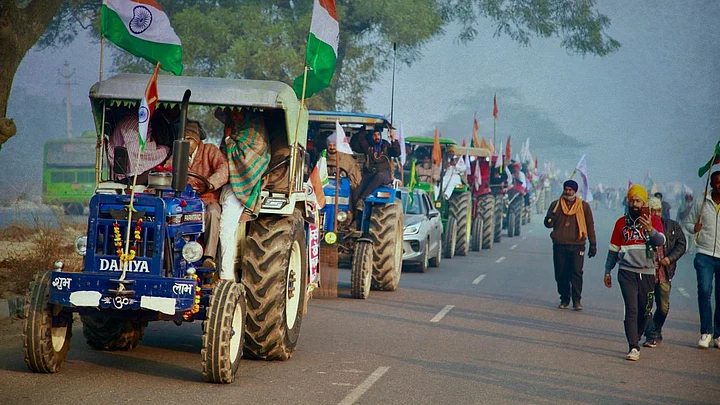How does it feel to be alive but not be visible to governments? How does it feel to speak but never be audible to media? Ask a farmer.
Farmers inherit a generational anger. Their most basic dreams are not realised, but passed on like pointless heirlooms to the next generation.
This includes the debris of failed promises of successive governments and the absence of representation of the poor farmer in the Indian democracy.
Although this rural anger is shared, farmer suicide households express it most intensely. Chasing inherited dreams has proven fatal for the farmer, and the households speak of their struggles to even merely survive. Every farmer suicide also intensifies the anger against the unresponsive system, which offers the ex-gratia as if to rid itself of a guilt.
Such households have been part of the farmer protests, and widows from the high farmer suicide states like Maharashtra have sat on the roads at the Delhi borders.
‘Farmers in One Place Represent Farmers In Every Place’
But those who support the controversial farm laws argue that farmers of all states are not represented in these protests. They contend that the protestors predominantly belong to northern India, and mainly Punjab and Haryana. The fourth highest farmer suicides, as per the National Crime Records Bureau, took place in Telangana in 2019. Telangana farmers did not participate heavily in Delhi protests, although a tractor parade was held on 26 January in Hyderabad to demand the repeal of the farm laws.
And yet, farmers in one place represent farmers in every place – because the generational anger is not just shared but also continuous.
Of the 33 districts of Telangana, Siddipet is among the top districts for farmer suicides. This is significant, because the district elects the state’s chief minister, finance minister, and more recently, an MLA of the BJP, a party which has been celebrating its entry into Telangana. The district is over 85 percent rural, and the main crops are maize, paddy and cotton.
‘My Father Killed Himself When He Couldn’t Repay Loans. He’d Struggled To Make The Crops Work’
28-year-old Mallesham is the son of a farmer who died by suicide in September 2020, due to cotton crop failure. A graduate, he left his job to help his father revive the failing farm in Thoguta mandal of the district. “We grow food for the country, but we sleep hungry,” he said. “I recall there used to be no electricity in the house to study for exams, but we are expected to compete with those in much better conditions.”
“My father struggled every minute of his life to make the crops work. It was difficult because the crops did not make a profit. He killed himself because he could not repay loans. And despite her age, my mother has to now work as a farm labour to support the family.”Mallesham, the 28-year-old son of a farmer who died by suicide in Sept 2020
“Now, it will get even tougher, as we will never get even the MSP due to the farm laws,” he said.
‘I Work Mainly As Farm Labour As That’s What I Can Count On’
Laxmi cultivates a three-acre farm in Jagdevpur mandal of the district. Her husband died in November 2020, due to crop failure and pending debts. She has to deal with loans of over Rs 6,00,000, which he has left behind. The main source of income is farm labour for which she gets paid Rs 300 a day, but the work is seasonal and sporadic.
Private moneylenders put constant pressure to repay the loans.
The 36-year-old Laxmi is quietly angry, as she says, “I tell them politely that when I am able to get some work and save money, I will repay. I work mainly as farm labour because that is what I can count on. The crops never get the right price, and there are no other options for income.”
‘We No Longer Speak About Our Problems’
Like in the case of the farm laws, the State does not engage with the farmers. In most cases of farmer suicides, the farmer receives inadequate or no State support, and has to rely on non-State sources.
Laxmi adds:
“No one has ever asked us how we survive on such a meagre income. During the time of elections even, they make promises. But no one ever asks us, what are our troubles and what help we want...now, we no longer speak about our problems to anyone anymore.”
‘The State Doesn’t Want Farmers To Be Seen Or Heard. This Is Bound To Change’
The concerns of the households that have lost a farmer are represented in the farmers’ protests in Delhi. Farmers and farm labour may not be able to leave their daily wages and crops unattended.
But the anger of every poor farmer is represented in the protests, and also their determination.
Despite their anger and helplessness, farmers waited patiently at Delhi borders, and allowed themselves to be contained by the police barricades for over 60 days.
But the State does not want the farmers to be seen, or to be heard; the State only wants the farmers to vote and to obey. That is bound to change.
(Dr Kota Neelima is an author and researcher with the Institute of Perception Studies, and writes on rural distress and farmer suicides. Her latest book is ‘Widows of Vidarbha, Making of Shadows’. She tweets @KotaNeelima. This is an opinion piece. The views expressed are the author’s own. The Quint neither endorses nor is responsible for them.)
(At The Quint, we question everything. Play an active role in shaping our journalism by becoming a member today.)
